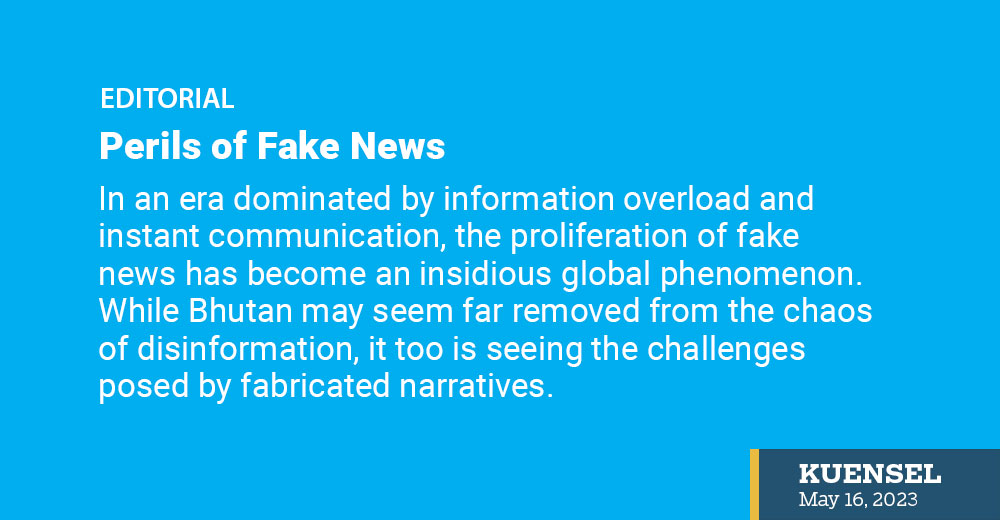In an era dominated by information overload and instant communication, the proliferation of fake news has become an insidious global phenomenon. While Bhutan may seem far removed from the chaos of disinformation, it too is seeing the challenges posed by fabricated narratives. The country faces a pressing need to confront the menace of fake news before it undermines the country’s social fabric and harmony.
Our unique history and cultural values have long fostered a sense of community, trust, and unity among its citizens. However, the rapid growth of digital media has introduced new risks to this delicate social ecosystem. Bhutan’s small population, coupled with its high internet penetration, presents fertile ground for the spread of false information that can quickly erode the fabric of trust upon which the nation’s progress is built. For instance, a video of a bull swimming in a lake in Punakha went viral creating so much confusion and debate among the netizens.
The consequences of fake news can be profound. Misleading narratives have the potential to incite communal tensions, exacerbate political divisions, and erode public trust in institutions. In Bhutan, where harmony and social cohesion are highly valued, the spread of false information can undermine the delicate balance that has defined our progress as a nation.
According to Bhutan Media Foundation’s Social Media Landscape in Bhutan 2021, about 90 per cent of the people are active members of at least one social media site, using it as their primary source of information.
A survey done by the Journalists’ Association Bhutan found that 64 percent of Bhutanese have encountered disinformation, which is false information created with the intention of profiting from it or causing harm, 35 percent have fallen victim to disinformation, and over 10 percent have spread disinformation knowingly or unknowingly, while 25 percent are not sure.
Facebook is the primary site for encountering disinformation on social media, with word of mouth coming to close second, according to the survey. Over 50 percent of the respondents also experienced disinformation on social media networks like WeChat, WhatsApp, Tik Tok, Instagram, and social media influencers.
The country has taken some steps to combat the spread of fake news. Education plays a crucial role in empowering citizens to identify and critically evaluate misinformation. Partnerships with media organizations and civil society groups are fostering dialogue and promoting responsible journalism.
Journalists bear a significant responsibility in upholding truth and promoting accurate reporting. Bhutan’s media landscape, though small, comprises dedicated professionals committed to delivering objective news to the public. Encouraging investigative journalism, fact-checking initiatives, and ethical reporting practices can help counter the spread of fake news while ensuring that the public remains well-informed.
By investing in education, regulating social media responsibly, and upholding the principles of responsible journalism, Bhutan can safeguard its unique social fabric and preserve the unity that lies at the heart of its progress.


